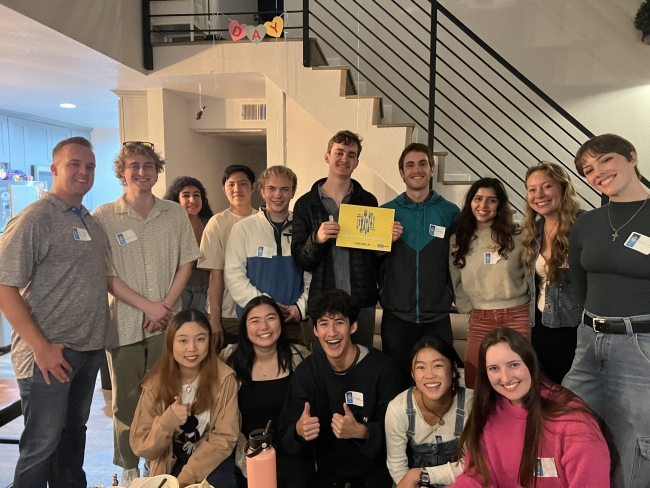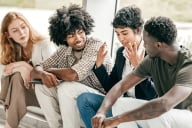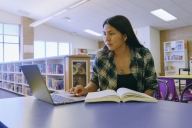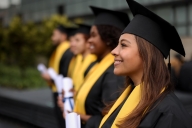You have /5 articles left.
Sign up for a free account or log in.

Dinners for 12 Strangers unites alumni and peers from UCLA over a meal.
UCLA Alumni Association
For three nights each spring, hundreds of University of California, Los Angeles students gather in alumni’s homes, sharing a meal among a small group and bonding over their experiences as Bruins.
The initiative, Dinners for 12 Strangers, started in the 1960s as a way to unite students with diverse perspectives over dinner and has evolved over the past 50 years to include present and former UCLA students across the globe.
The goal is to provide a low-stakes event for students to engage with peers who they might not otherwise meet and continue a legacy of community among grads.
The background: The first dinner was hosted in 1968 by the Gold Shield Alumnae of UCLA as a way to foster understanding between community members during the Civil Rights Era.
“They thought it was a great program that would help facilitate conversations with students [and] alumni to talk about differences and what was going on in the world,” explains Christina Ruiz, associate director of Student Alumni Programs & Family Engagement.
After the initial event, the program grew, with alumni hosting more and more dinners. The events remain alumni-hosted, but now serve two populations: current students and faculty, or exclusively alumni.
At present, D12, as its colloquially called, is organized by UCLA’s alumni affairs staff and student employees, led by Ruiz.
How it works: Coordinating the dinners is a months-long process, Ruiz explains. In November, Ruiz and her team put out a call for alumni hosts and interest applications open for attendees in January.
Student participants select which of the three nights they are available and then are randomly sorted and assigned to dinner parties, with some exceptions. In the intake form, students indicate if they belong to any special identity group and if they would be open to participating in a dinner exclusive to that population. This year, there were three LGBTQ+ focused dinners, for example.
Alumni get to select which dinner they’ll attend, whether in-person or over Zoom, most geographically based further than Los Angeles, and some internationally.
After selecting who will attend which dinner, staff send out a hosting kit to alumni to provide some gentle guidelines and expectations in planning and organizing the event. Hosts also receive a kitchen-themed gift (such as an apron or pot holder) with D12 branding.
While traditionally dinners were limited to 12 people, each event has its own cap, with some alums only able to host a handful of students in their residence, whereas others host over a dozen Bruins.
The type of food participants enjoy is up to the hosts. For student-focused dinners, hosts are responsible for providing the dinners.
“The variations of the dinners that happen are really wide,” Ruiz says. “It could be as simple as ordering pizza, because I’m a recent grad who wants to still host because I went to it a couple years ago. And some, they wanted to make that experience for students very lavish and hosted dinners where it’s catered, or they take you to a really fancy dinner.”
Alumni events are more fluid, sometimes completely online, other times taking place at restaurants or potluck style in the host’s home.
In addition to enjoying the free meal, student employees organize transportation for student participants, either selecting drivers among the group to take them off campus or hailing an Uber.
The dinners normally last around two hours, with get-to-know-you games or icebreakers providing talking points before, during or after the meal. After, participants can elect to share their contact information to stay in touch and hopefully, be part of a future dinner to meet a new group of community members.
The impact: This spring, 2,000 people participated, around 800 of which were students, with 200 student dinners taking place in the LA area.
While “12” hasn’t remained a staple of the dining experience, “strangers” remains a key component. UCLA is a big enough campus that randomly organizing students creates groupings where few know each other prior to the event.
“It’s always nice to hear people talk about … the people they might have never have met and also the connections they made,” Ruiz says. “Even in our international dinners around the world, it’s knowing that there are other Bruins in their area is what makes it so special … It’s a beautiful way to keep Bruins connected around the world.”
Ruiz’s team collects feedback after the dinners, as well, to see who ended up attending the dinner and how it went.
The tradition has changed over the years, including more members of the UCLA community. During remote instruction due to the COVID-19 pandemic, alumni hosted the first-ever virtual dinners, uniting Bruins from around the world over a shared recipe or type of food. Parents were allowed to join for the first time during remote dinners, as well.
Since returning to in-person events, staff have seen less interest for the dinners, but Ruiz hopes to tap into a larger alumni base to continue to connect Bruins around the world. She also wants to explore the potential of connecting students studying abroad with alumni in their host cities.
DIY: For another college or university looking to model D12, Ruiz recommends:
- Finding alumni champions. Part of the long-standing success of Dinners for 12 Strangers is the passion held by past participants who choose to host as alumni.
- Investing in the intake. Grouping several hundred people into dinner parties is a massive undertaking, so finding a program or software that allows for easy data collection and organization is key to a smooth operation.
- Setting expectations. The word “strangers” can make students and hosts nervous, so providing guidance around what to expect or how to put on a successful event can help assuage some nerves and create a welcoming environment for all involved.
- Encouraging creativity. Part of what makes D12 interesting year after year is the personal interests of the alumni hosts that add to the dinner, whether that’s fun games or dishes connected to one’s cultural heritage.
Seeking stories from campus leaders, faculty members and staff for our Student Success focus. Share here.








